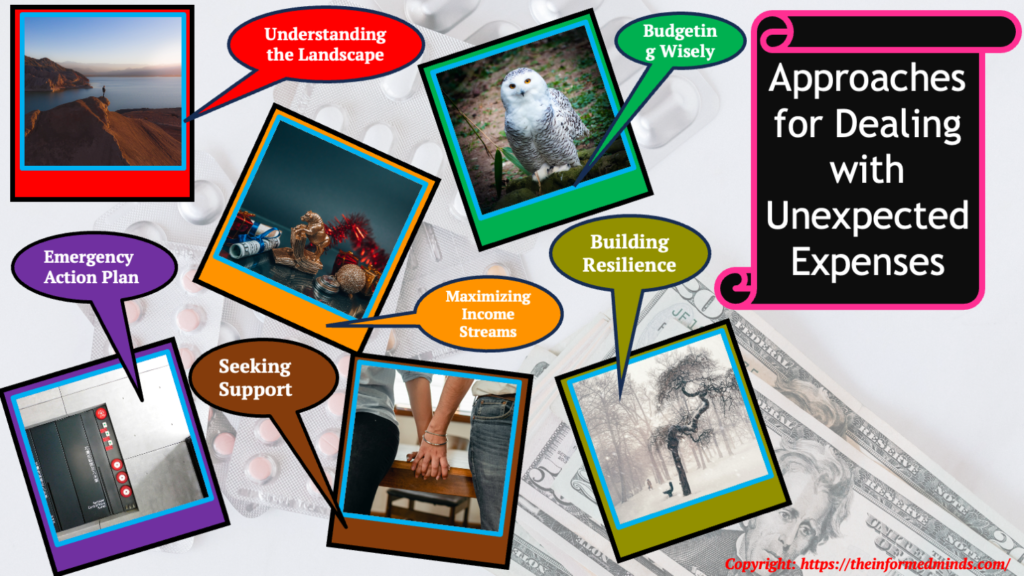To Share is to Show You Care!
In the unpredictable journey of life, unexpected expenses and emergencies can throw even the most meticulously planned budgets into disarray. However, fear not! In this comprehensive guide for 2023, we’ll explore the best strategies to navigate these unforeseen challenges and turn tears into triumph.

1. Understanding the Landscape
1.1 Financial Health Checkup
- Conduct a thorough assessment of your financial health, including income, expenses, and outstanding debts.
- Use tools like budgeting apps or financial planners to gain insights into your spending habits and identify areas for improvement.
1.2 Emergency Fund Essentials
- Establish a dedicated emergency fund with at least three to six months’ worth of living expenses.
- Consider keeping the emergency fund in a separate account, easily accessible but not intermingled with daily spending.
2. Budgeting Wisely
2.1 Tracking Daily Expenses
- Keep a meticulous record of your daily expenses to identify patterns and areas where you can cut back.
- Utilize expense tracking apps to automate this process and receive real-time insights into your spending behavior.
2.2 Negotiating Bills and Expenses
- Contact service providers to negotiate bills and explore potential discounts or promotional offers.
- Regularly review and switch to more cost-effective alternatives for utilities, insurance, and subscription services.
3. Maximizing Income Streams
3.1 Investment Diversification Strategies
- Explore various investment options, including stocks, bonds, real estate, and mutual funds, to diversify your portfolio.
- Consider consulting a financial advisor to tailor an investment strategy that aligns with your risk tolerance and financial goals.
3.2 Side Hustle Success
- Identify your skills and interests to find a suitable side hustle that complements your primary income.
- Leverage online platforms and marketplaces to showcase your talents and connect with potential clients or customers.
4. Emergency Action Plan
4.1 Prioritizing Debts
- Create a list of outstanding debts, prioritizing high-interest debts for faster repayment.
- Explore debt consolidation options to streamline payments and potentially reduce interest rates.
4.2 Building a Crisis Fund
- In addition to an emergency fund, create a separate crisis fund for specific situations, such as medical emergencies or unexpected home repairs.
- Regularly contribute to both funds to ensure they remain robust and adaptable to various financial challenges.
5. Seeking Support
5.1 Financial Counseling Resources
- Seek the guidance of financial counselors or advisors to gain personalized insights into your financial situation and receive expert advice.
- Take advantage of online resources, workshops, or community programs that offer free or affordable financial education.
5.2 Networking for Opportunities
- Leverage professional and social networks to discover potential job opportunities, freelance gigs, or collaborative projects.
- Attend local meetups or virtual events to expand your network and uncover hidden possibilities for income and support.
6. Building Resilience
6.1 Continuous Learning and Adaptation
- Stay informed about financial trends, investment strategies, and economic developments to make informed decisions.
- Embrace a mindset of continuous learning, adapting your financial strategies as your life circumstances and economic conditions evolve.
6.2 Psychological Resilience
- Develop coping mechanisms for managing stress related to financial challenges.
- Consider mindfulness practices, meditation, or seeking professional support to enhance your psychological resilience.
7. Best Books Available on Personal Finance
Please note that the Pros and Cons provided here are condensed from customer reviews found on Amazon. It’s important to gently caution that individual experiences may differ, and those considering the purchase and use of this product should assess it based on their own perspective.
7.1 Personal Finance 101: From Saving and Investing to Taxes and Loans, an Essential Primer on Personal Finance (Adams 101 Series)
 | Why should you buy this book? Comprehensive Overview: Praises for providing a thorough introduction to personal finance and investing, beneficial for both present and retirement planning. Positive Financial Advice: Multiple reviews highlight the book’s sound financial advice, especially tailored for the average person. Great for Beginners: Recommended for beginners, emphasizing its detailed coverage of basic financial concepts. Useful for Retirement Planning: Receives positive feedback for insights into retirement planning, offering valuable tips on debt, investments, and retirement. Effective Visual Aids: Engaging illustrations and charts enhance the learning experience, making complex financial concepts more accessible. |
7.2 The Infographic Guide to Personal Finance: A Visual Reference for Everything You Need to Know
 | Why should you buy this book? Friendly and Easy to Follow: Readers appreciate the clear and helpful topics presented in a friendly manner. The use of fun graphics enhances the overall reading experience. Great for Young Adults: Described as an excellent resource for those about to enter adulthood, the book covers comprehensive financial topics, sparking an interest in further learning. Useful for Various Audiences: Highly recommended for both young adults starting their financial journey and individuals looking for a refresher on personal finance. The book is acknowledged as a quick and easy read. Life-Changing Content: Readers express that the book changed their perspective on finance, making it a transformative read that positively impacted their financial outlook. Visual Layout and Illustrations: The infographic layout is praised for making the book easy to understand, especially for visual learners. The use of visuals aids in conveying complex financial concepts effectively. |
7.3 Personal Finance For Dummies
 BUY ME HERE^ | Why should you buy this book? Comprehensive and Understandable: Readers appreciate the book’s comprehensive coverage of personal finance in easy-to-understand terms. Life-Changing Impact: Positive impacts include retirement, financial issue discovery, and overall financial security improvements. Suitable for Beginners: Well-received for beginners, offering foundational knowledge for managing finances effectively. |
7.4 How to Adult: Personal Finance for the Real World
 | Why should you buy this book? Comprehensive Financial Education: Provides essential knowledge on managing money, paying taxes, building wealth, and other crucial financial concepts, making it a valuable resource for those with little to no financial knowledge. Accessible and Understandable: Written in easy-to-understand terms, making it suitable for readers of all ages. The book is praised for its clarity in explaining complex financial topics. Life-Changing Impact: Readers mention positive life changes, improved financial literacy, and a newfound ability to take control of their finances after reading the book. Practical and Applicable: Offers practical advice and real-world examples, making it relevant for immediate application. The book is described as a valuable tool for making informed financial decisions. Useful for Various Age Groups: While recommended for young adults, the book is appreciated by readers of different ages, from recent high school graduates to individuals in their 40s, highlighting its broad appeal. |
7.5 What I Learned About Investing from Darwin
 | Why should you buy this book? Insightful Parallel with Evolution: The book draws a compelling parallel between the world of investing and the principles of evolution, providing readers with a unique perspective on financial markets. Practical Wisdom: Readers appreciate the practical wisdom shared by the author, Pulak Prasad, who not only highlights successes but also acknowledges mistakes, making the book relatable and valuable for long-term wealth creation. Comparable to Investment Classics: Reviewers liken the book to investment classics such as “Reminiscences of a Stock Operator” and “The Intelligent Investor,” placing it among the best investment books of all time. Clear and Engaging Writing Style: The book is praised for its clear and engaging writing style, described as a blend of Malcolm Gladwell and Peter Lynch. The author covers a wide range of topics, seamlessly weaving between investing and Darwin’s theory. Life-Changing Impact: Some reviewers describe the book as life-changing, applicable not only to public and private business investors but also to those contemplating starting a business. The simplicity of the approach is highlighted as one of the most rewarding aspects. |
Conclusion
Life’s surprises may be inevitable, but with a proactive and strategic approach, you can navigate through unexpected expenses and emergencies with resilience and strength. Remember, every challenge is an opportunity for growth and transformation. By implementing these detailed strategies, you can turn tears into triumph and emerge even stronger on the other side. Here’s to a resilient and financially empowered 2023!
Frequently Asked Questions
Q1: How do you typically handle unexpected expenses or emergencies?
A: I approach unexpected expenses by maintaining a well-established emergency fund, ensuring financial preparedness. This fund acts as a safety net, allowing me to cover unforeseen costs without disrupting my overall financial stability.
Q2: How do you deal with unforeseen expenses?
A: I proactively manage unforeseen expenses by closely monitoring my budget and, when necessary, reallocating funds to address immediate needs. This involves a careful reassessment of priorities to ensure financial flexibility.
Q3: How do you deal with random expenses?
A: Random expenses are addressed by incorporating a miscellaneous category into my budget. This provides a buffer for unexpected costs, allowing me to accommodate unforeseen expenses without impacting my core financial commitments.
Q4: How do you manage unexpected costs?
A: To manage unexpected costs, I employ a three-step approach: assessing the severity of the situation, prioritizing expenses, and exploring available resources, such as emergency funds or negotiating payment plans with creditors.
Q5: What are the most common emergency expenses?
A: Common emergency expenses include medical bills, car repairs, home maintenance issues, and unexpected travel costs. These events often require immediate financial attention and highlight the importance of preparedness.
Q6: What is considered an unexpected expense?
A: An unexpected expense is any cost that arises spontaneously and is not part of regular budgeting. This can include sudden home repairs, medical emergencies, or unexpected travel requirements.
Q7: How do people prepare for unforeseen events?
A: People prepare for unforeseen events by establishing emergency funds, purchasing insurance coverage, and maintaining a flexible budget. Additionally, staying informed about financial trends contributes to better preparedness.
Q8: What is not true about unexpected expenses?
A: Unexpected expenses are not always unavoidable. With careful financial planning, such as creating emergency funds and having insurance coverage, individuals can mitigate the impact of unexpected costs.
Q9: What is one way to minimize the impact of unplanned spending on a budget?
A: One effective way to minimize the impact of unplanned spending on a budget is to regularly review and adjust the budget. This ensures that it remains aligned with financial goals and accommodates unexpected expenses.
Q10: What is an example of an unexpected financial hardship?
A: An unexpected financial hardship could be a sudden job loss, a significant medical expense not covered by insurance, or a natural disaster that results in property damage. These events can strain financial resources unexpectedly.
Q11: What is another word for unforeseen expenses?
A: Another term for unforeseen expenses is “contingency costs” or “unanticipated expenditures.” These terms emphasize the unpredictable nature of such financial obligations.
The Informed Minds
I'm Vijay Kumar, a consultant with 20+ years of experience specializing in Home, Lifestyle, and Technology. From DIY and Home Improvement to Interior Design and Personal Finance, I've worked with diverse clients, offering tailored solutions to their needs. Through this blog, I share my expertise, providing valuable insights and practical advice for free. Together, let's make our homes better and embrace the latest in lifestyle and technology for a brighter future.

